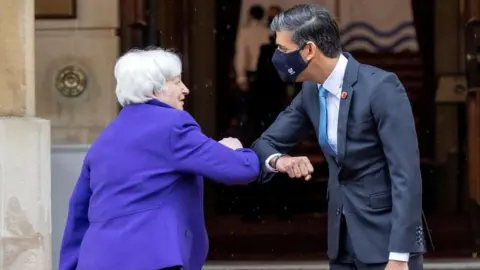Nations agree to 15% minimum corporate tax rate
 Getty Images
Getty ImagesMost of the world's nations have signed up to a historic deal to ensure big companies pay a fairer share of tax.
A hundred and thirty six countries agreed to enforce a corporate tax rate of at least 15% and a fairer system of taxing profits where they are earned.
It follows concern that multinational companies are re-routing their profits through low tax jurisdictions.
Countries including Ireland had opposed the deal but have now agreed to the policy.
UK Chancellor Rishi Sunak said the deal would "upgrade the global tax system for the modern age".
"We now have a clear path to a fairer tax system, where large global players pay their fair share wherever they do business," he said.
The Organisation for Economic Cooperation and Development (OECD), an intergovernmental organisation, has led talks on a minimum rate for a decade.
It said the deal could bring in an extra $150bn (£108bn) of tax a year, bolstering economies as they recover from Covid.
Yet it also said it did not seek to "eliminate" tax competition between countries, only to limit it.
The floor under corporate tax will come in from 2023. Countries will also have more scope to tax multinational companies operating within their borders, even if they don't have a physical presence there.
 Getty Images
Getty ImagesThe move - which is expected to hit digital giants like Amazon and Facebook - will affect firms with global sales above 20 billion euros (£17bn) and profit margins above 10%.
A quarter of any profits they make above the 10% threshold will be reallocated to the countries where they were earned and taxed there.
"[This] is a far-reaching agreement which ensures our international tax system is fit for purpose in a digitalised and globalised world economy," said OECD Secretary-General Mathias Cormann.
"We must now work swiftly and diligently to ensure the effective implementation of this major reform."

'Winners and losers'
This deal marks a sweeping change in approach when it comes to taxing big global companies.
In the past, countries would frequently compete with one another to offer an attractive deal to multinationals. It made sense when those companies might come in, set up a factory and create jobs. They were, you could say, giving something back.
But the new digital era giants have become adept at simply moving profits around, from the regions where they do business to those where they will pay the lowest taxes. Good news for tax havens, bad news for everyone else.
The new system is meant to minimise opportunities for profit shifting, and ensure that the largest businesses pay at least some of their taxes where they do business, rather than where they choose to have their headquarters.
Some 136 countries have signed up - an achievement in itself. But inevitably there will be losers as well as winners.

'Race to the bottom'
Ireland, Hungary and Estonia - all of which have corporate tax rates below 15% - at first resisted the plan but are now on board.
Ireland currently has a rate of 12.5%, which has helped it attract large amounts of foreign investment and become a base for big US firms such as Apple. But after securing a compromise on the wording of the agreement, Finance Minister Pascal Donohoe said he was "absolutely certain" Ireland's interests were served by being part of the deal.
However, Kenya, Nigeria, Pakistan and Sri Lanka have not yet signed up to the plan.
The pact resolves a spat between the US and countries such as the UK and France, which had threatened a digital tax on big mainly American tech firms.
US Treasury Secretary Janet Yellen said: "As of this morning, virtually the entire global economy has decided to end the race to the bottom on corporate taxation.
"Rather than competing on our ability to offer low corporate rates, America will now compete on the skills of our workers and our capacity to innovate, which is a race we can win."
'Off the hook'
Facebook welcomed the deal, saying it has long called for reform of global tax rules.
"We recognise this could mean paying more tax, and in different places," said Nick Clegg, its vice president for global affairs. "The tax system needs to command public confidence, while giving certainty and stability to businesses. We are pleased to see an emerging international consensus."
But Argentine economy minister Martin Guzman said the proposals would do little to help developing countries. Despite agreeing to the pact, he had argued for a tax rate of at least 21%.
Oxfam also said the 15% rate was too low and would "let big offenders... off the hook". The corporate tax rate in industrialised countries averages at 23.5%, well above the agreed 15% floor.
Oxfam's tax policy lead Susana Ruiz said: "The world is experiencing the largest increase in poverty in decades and a massive explosion in inequality but this deal will do little or nothing to halt either. Instead, it is already being seen by some wealthy nations as an excuse to cut domestic corporate tax rates, risking a new race to the bottom."
